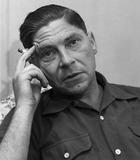
Arthur Koestler (Budapest, 1905-London, 1983), writer and journalist of Hungarian origin nationalized British, is one of the most fascinating intellectual figures of century XX. Born into a Jewish family, he entered a Zionist organization during his university life in Vienna and decided to join one of the first kibbutz found in Palestine. Disenchanted with the experience, begins to work like journalist, activity that takes to Paris and Berlin, where in 1931, after participating in the arctic expedition of Graf Zeppelin, enters the Communist Party. A year later he traveled to Russia, invited by the Comintern to write a book of propaganda. On his return, Germany has already fallen into the hands of Nazism, so Koestler moves to Paris and collaborates with the anti-fascist movement. During the Spanish Civil War travels as a correspondent to the Andalusian front, where he is arrested and sentenced to death. Released by international pressure, he returns to France and, disenchanted with the communist myth, leaves the Party in 1938. However, French police interned him in a concentration camp with other leftists at the outbreak of World War II. After the fall of France and a brief passage by the Foreign Legion, it fled to England, and, through its writings and conferences, it becomes one of the majors critics of the Stalinism during the postwar, time in which makes two trips to Palestine and witness the Arab-Israeli war and the birth of the State of Israel. In the fifties he settled definitively in England and, after experiencing a "vocational change", said goodbye to politics and resumed his interest in science and philosophy, in which he would focus his activity until his death in 1983. His legacy is an extensive written production that includes memoirs, novels and essays of varied subject.




